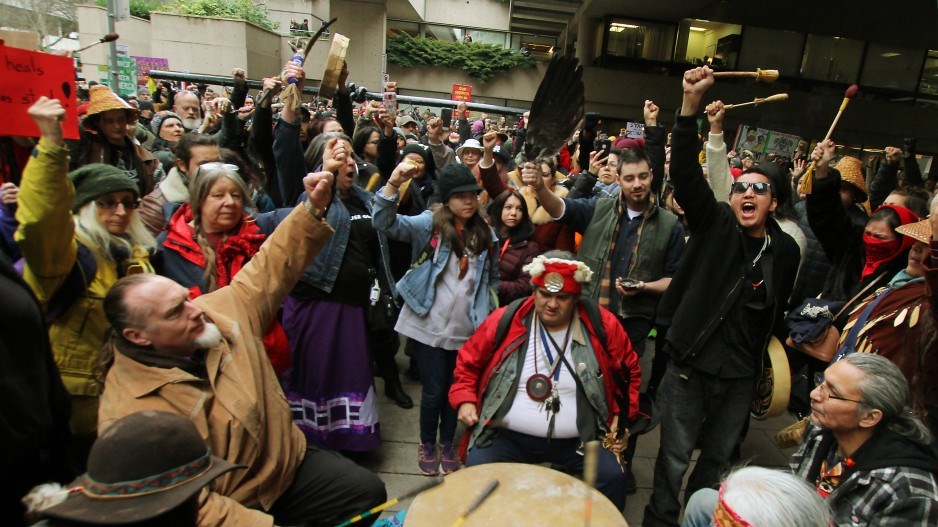Members of the Wet’suwet’en who are opposed to the $6.2 billion Coastal GasLink pipeline have every right to protest the project, says Premier John Horgan.
But as far as his government is concerned, the elected band councils – including those in Wet’suwet’en territory – that signed benefits agreements had authority to sign those agreements and the project has met all conditions, including conditions requiring the project proponents to get First Nations consent.
“We recognize the rights of individuals to protest," Horgan said at a Wednesday, January 9 press conference. "We recognize the rights of those across the country who wanted to voice their concerns about this project. However, it has been my view that LNG Canada has shown they understand the importance of consultation and meaningful reconciliation with First Nations, and that’s why they have signed agreements with every First Nation along the corridor.”
Horgan addressed media Wednesday after his minister of Forests, Doug Donaldson, came under fire for what looked like support for hereditary chiefs who are opposed to the project, raising questions over whether the NDP government supports the elected or unelected leaders.
Some hereditary chiefs participated in roadblocks that were broken up January 7, when RCMP enforced an injunction and arrested 14 protesters.
Donaldson was pictured meeting with some of them prior to the RCMP taking action. The Liberals said Donaldson had not only met with them, but had offered support for the hereditary leaders, which was seen as taking sides against the elected Wet’suwet’en leaders who support the project.
Horgan said Donaldson is the MLA for that region, and that it was therefore appropriate for him to meet with constituents “one last time” before the injunction was enforced.
“I believe if you’re going to find a solution, you need to have a dialogue, and who better than the local MLA to be there before the RCMP enforce the order to hear one last time what the concerns were?” Horgan said.
The Wet’suwet’en First Nation are one of the 20 First Nations that signed benefits agreements in support of the $6.2 billion Coastal GasLink project, which is part of the $40 billion LNG Canada project.
But questions have been raised over who properly represents the Wet’suwet’en – elected band councils, or hereditary chiefs.
A number of Wet’suwet’en hereditary chiefs are opposed to the project, and have taken part in blockades aimed at stopping coastal GasLink workers from accessing public roads and bridges.
Stewart Phillip, grand chief of the Union of BC Indian Chiefs, has said the elected band councils of the Wet’suwet’en do not have authority over lands outside reserve lands, and that the hereditary chiefs are therefore the rightful representatives.
“Indian band councils have power, authority and jurisdiction over the reserve land base,” Phillip said. “We also know that the Tsilhqot’in case, that went to the Supreme Court of Canada, said very clearly that our aboriginal title and rights interests are territorial-wide in nature.”
Robin Junger, an aboriginal and environmental law expert with McMillan LLP, said that either elected or hereditary leaders can represent their people in rights and title issues. It all depends on who the First Nation members themselves grant authority to represent them.
“If the First Nation itself has decided that it wants the band to represent it in relation to rights and title issues, then other parties will accept the band as doing so, but the First Nation will have to give it that authority,” he said.
Horgan conceded that the question of who can represent First Nations is complicated.
“The challenge for governments, federal and provincial, is determining how we bring together the historic band council model with – as I understand it – the emerging hereditary model that is very much manifesting itself in Wet’suwet’en territory,” he said, adding “every circumstance is different.”
In the Coastal GasLink-Wet’suwet’en case, the Horgan government appears to accept that the elected councils that signed benefit agreements had the proper authority to do so.
“In this case, a natural gas pipeline that has support of 20 of the 20 nations – bands – along the corridor, and impact benefit agreement are in place that include hereditary support,” Horgan said.
“All nations from wellhead to waterline had signed impact benefit agreements. We believe that LNG Canada has met the obligations that we asked them to achieve.”




